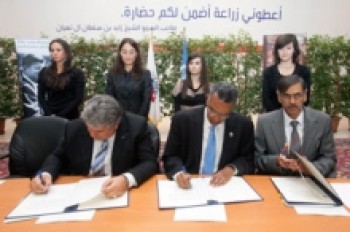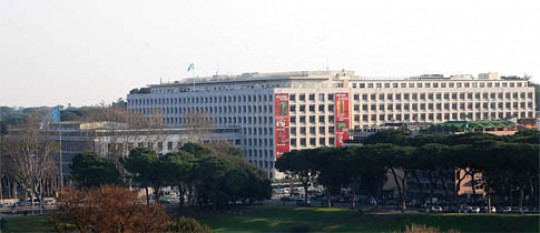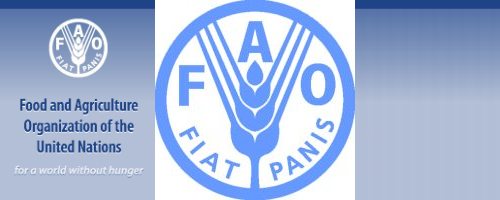Peace corps strengthens global partnership with FAO and WFP
Peace corps strengthens global partnership with FAO and WFP
Letter of agreement signed during Committee on World Food Security annual meeting
 20 October 2011, Rome/Washington, D.C – The Peace Corps joined the Food and Agriculture Organization of the United Nations (FAO) and the World Food Programme (WFP), and pledged to support and expand food security-related activities that will combat hunger in Peace Corps countries worldwide.
20 October 2011, Rome/Washington, D.C – The Peace Corps joined the Food and Agriculture Organization of the United Nations (FAO) and the World Food Programme (WFP), and pledged to support and expand food security-related activities that will combat hunger in Peace Corps countries worldwide.
Today, Peace Corps Director Aaron S. Williams, FAO Deputy Director- General for Operations Manoj Juneja (representing Director-General Jacques Diouf), WFP Deputy Executive Director of External Relations and Chief Operating Officer Amir Abdulla (representing Executive Director Josette Sheeran) and Ertharin Cousin, U.S. Ambassador to the United Nations Agencies for Food and Agriculture, signed a joint letter of agreement at the 37th Committee on World Food Security at FAO headquarters in Rome, Italy.
“In response to increased food security challenges throughout the world, the Peace Corps is committed to doing its part to help address this critical issue at the grassroots level,” said Peace Corps Director Aaron S. Williams. “Through the important partnerships with FAO and WFP, Peace Corps volunteers will have access to more tools and technical expertise to help improve food security in the communities they serve.”
“FAO and the Peace Corps have a long history of working together in rural communities throughout the world,” said FAO Director-General Jacques Diouf. “Our collaboration has expanded gradually over the years and this agreement signals a renewed, enhanced commitment to harnessing the respective strengths and expertise of our three organizations to tackle the root causes of hunger and ensure sustainable food security and economic development.”
“Today’s ceremony highlights the shared commitment of all three of our organizations to give vulnerable individuals in the many nations where we all work a hand up, not just a hand out, to improve their own ability to produce and access food for their families and communities,” said WFP Executive Director, Josette Sheeran. Peace Corps volunteers have worked with FAO and WFP in nearly 40 countries, sharing techniques and practices identified to promote food security through broad-based citizen participation, education, and capacity building.
In Swaziland, WFP provided Peace Corps volunteers training on sustainable gardening and organic farming techniques. Additionally, Peace Corps volunteers and WFP worked together to provide nutrition and hygiene education to children. In Liberia, four Peace Corps Response volunteers have been assigned to WFP to provide information to community leaders on proper food storage, handling, and cooking at local schools. In Namibia, recently returned Peace Corps volunteer John Stoecker of Rolla, Mo., and 20 local community volunteers worked on a community garden to grow vegetables for people living with HIV/AIDS. Stoecker and FAO also coordinated with other local partners to organize a community gardening workshop.
“The launch of the renewed and expanded partnerships between the Peace Corps, FAO and WFP provides continued collaboration in the area of food security,” said U.S. Ambassador to the UN Food and Agriculture Agencies Ertharin Cousin. “The U.S. Mission to the UN Agencies in Rome is committed to supporting these partnerships by serving as the link between the Rome-based UN agencies and the United States Government.”
Since 1961, Peace Corps volunteers have addressed the adverse impact of food shortages in the countries they have served. Projects have ranged from fish farming and the introduction of small scale irrigation systems to improved food processing and marketing of food. Volunteers have also helped address food availability and nutrition through a variety of projects, including building school gardens, developing agricultural microenterprises, and educating others about good nutrition.
###
> UN Food and Agriculture Organization (FAO).
The Food and Agriculture Organization of the United Nations (FAO) is an intergovernmental organization and has 191 Member Nations, two associate members and one member organization, the European Union. Achieving food security for all is at the heart of FAO’s efforts – to make sure people have regular access to enough high-quality food to lead active, healthy lives.

FAO’s mandate is to raise levels of nutrition, improve agricultural productivity, better the lives of rural populations and contribute to the growth of the world economy.
The Food and Agriculture Organization of the United Nations (FAO) is working with its Members and the entire international community for achievement of the Millennium Development Goals.
These eight goals – each with specific targets and indicators – are based on the United Nations Millennium Declaration, signed by world leaders in September 2000. They commit the international community to combating poverty, hunger, disease, illiteracy, environmental degradation, and discrimination against women.
![]()
The eight Millennium Development Goals are:
Goal 1: Eradicate extreme poverty and hunger
Goal 2: Achieve universal primary education
Goal 3: Promote gender equality and empower women
Goal 4: Reduce child mortality
Goal 5: Improve maternal health
Goal 6: Combat HIV/AIDS, malaria and other diseases
Goal 7: Ensure environmental sustainability
Goal 8: Develop a Global Partnership for Development
* More information at UN Food and Agriculture Organization (FAO)
###
> United Nations (UN).
 The United Nations was established on 24 October 1945 by 51 countries committed to preserving peace through international cooperation and collective security. Today, nearly every nation in the world belongs to the UN: membership totals 192 countries.
The United Nations was established on 24 October 1945 by 51 countries committed to preserving peace through international cooperation and collective security. Today, nearly every nation in the world belongs to the UN: membership totals 192 countries.
When States become Members of the United Nations, they agree to accept the obligations of the UN Charter, an international treaty that sets out basic principles of international relations. According to the Charter, the UN has four purposes:
- to maintain international peace and security;
- to develop friendly relations among nations;
- to cooperate in solving international problems and in promoting respect for human rights;
- and to be a centre for harmonizing the actions of nations.
###
* The above story is adapted from materials provided by United Nations (UN)
** More information at United Nations (UN)




















